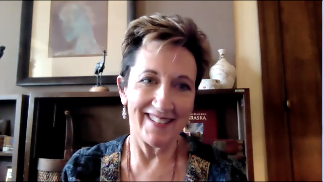By Kellyn Vuchetich
April 6, 2021
In the face of the pandemic, mental health deterioration as a result of financial hardship, social isolation, healthcare-related anxiety, and the general stress of dealing with uncertainty has remained a national concern.
In response to the staggering need for public mental health support, Nebraska recently introduced LB247, a bill to create a 3-digit Mental Health Crisis Hotline Task Force.
The proposed hotline is intended to relieve pressure from the 911 system by directing mental and behavioral health calls to 988, the number nationally designated by Congress in 2020. The 3-digit number will serve as an easy-to-remember, more accessible alternative to similar existing services, such as the National Suicide Hotline, while simultaneously allowing those in crisis to have their needs met quickly and with the appropriate response team.

Nebraska State Senator Pansing Brooks
Senator Patty Pansing Brooks, who sponsors the bill, is excited for what it could mean for the future of mental health funding in Nebraska.
“Since I’ve been in the legislature, mental health has been one of the most significant concerns and top needs for Nebraska,” says Pansing Brooks. “I’ve been in Judiciary, and the prison overcrowding situation is largely tied to mental health and behavioral health. We are placing people in custody and prison often where there are major mental health issues.”
Utah is the first state to pass legislation regarding the 988 hotline. Pansing Brooks claims Nebraska is likely the second or third state to be investigating it. “What’s happening in Utah and in other places is that 911 and 988 responders work together, and there will be times when both sets [of responders] go out. There will be times when they determine that the law enforcement 911 responders need to go into a situation first, or there may be other times where the 988 mental health and behavioral health people need to go into the situation first to diffuse something or to provide immediate aid to that person.”
Similar crisis response services are offered by existing organizations, such as CenterPointe, a local non-profit providing various mental health and substance abuse services to the Lincoln community. The CenterPointe crisis response team has three components: a 24/7 hotline, walk-in crisis therapy during business hours, and field response within the community. Field response is occasionally carried out alongside law enforcement, depending on the threat assessment to the crisis responder. About 2% of crisis responses in the past 12 months have been initiated by the Lincoln Police Department requesting de-escalation assistance or referrals.
CenterPointe’s crisis line is operated by a combination of licensed therapists, peer supporters (trained individuals who identify as having lived experience with mental health and substance issues), and other individuals who have been trained in crisis response. CenterPointe CEO Topher Hansen recognizes that the expertise of his organization will soon play an integral role in developing the 988 hotline.
“We look forward to participating in the conversation about how to do this well in Lincoln and in Nebraska,” says Hansen. “There’d be nothing better than if through the things that we did, we had enough resources where people weren’t committing suicide, or were getting care as quickly as possible.”
The total number of crisis contacts to CenterPointe–including hotline calls, walk-ins, and field interventions–rose from 2,999 for March 2019 – February 2020, to 3847 from March 2020 – February 2021. “This has never been more important and more on the minds of the people of Nebraska because the pandemic has put everyone in touch with their own mental health in a way that they maybe hadn’t been before,” notes Hansen.
In order to successfully integrate pre-existing emergency services and introduce a mental and behavioral health response team, the 988 service will require a massive collaborative effort. For this reason, Sen. Pansing Brooks decided to introduce the bill as a study, which will allow for all the necessary stakeholders to be consulted in the process of developing the service. These stakeholders will include mental health professionals, medical professionals and law enforcement, as well as the Public Service Commission, who regulates telecommunications carriers and controls emergency systems through 911.
“I want to find out for sure that all the stakeholders voices are heard–that everybody understands what’s going on,” says Pansing Brooks. “It’s going to be the future. There’s no question it’s going to happen, and I just wanted to make sure that Nebraska, through a study, rolled this out carefully and thoughtfully, that it was a bipartisan effort, and that we made sure that it was done with wise and careful information from everybody.”
Pansing Brooks has taken steps to ensure that the bill is passed as quickly as possible. “I brought it out and asked the speaker to make a priority for it, and the speaker has prioritized this bill which I’m really grateful for. Speaker Hilgers realized its importance and the fact that this is going to be a significant part of our future.” An emergency clause has also been added to the bill. “Once it gets the 30 votes, if it has the emergency clause on, then it will pass much more quickly and the committee can be formed to study this and I think that we’ll have a solution more rapidly.”
It is unclear at this point when the 988 number would be ready for use in Nebraska once the bill is passed, but Pansing Brooks anticipates that the number 988 will soon become as widely known as 911. “It’s so new that people haven’t been hearing about it,” she says. “So I think within the next year or two, everyone’s going to be talking about 988.”
As of March 31, 2021, the bill has been placed on Select File, the second stage at which a bill is considered by the full Legislature. Pansing Brooks maintains that while the hotline should involve careful consideration from all parties involved, the issue of mental health in Nebraska requires urgent action.
“Every 32 hours in Nebraska one person commits suicide,” says Pansing Brooks. “We all have people that we know and love whose lives have been touched by mental health issues, so we all need to work together to make this a possibility here in Nebraska as soon as possible.”
The 988 Mental Health Crisis Hotline is still in the works. If you are facing a mental health crisis, there are resources currently available. You can reach CenterPointe Crisis Line at 402-475-6695 or National Suicide Hotline at 800-273-8255.
In the face of the pandemic, mental health deterioration as a result of financial hardship, social isolation, healthcare-related anxiety, and the general stress of dealing with uncertainty has remained a national concern.
In response to the staggering need for public mental health support, Nebraska recently introduced LB247, a bill to create a 3-digit Mental Health Crisis Hotline Task Force.
The proposed hotline is intended to relieve pressure from the 911 system by directing mental and behavioral health calls to 988, the number nationally designated by Congress in 2020. The 3-digit number will serve as an easy-to-remember, more accessible alternative to similar existing services, such as the National Suicide Hotline, while simultaneously allowing those in crisis to have their needs met quickly and with the appropriate response team.
Senator Patty Pansing Brooks, who sponsors the bill, is excited for what it could mean for the future of mental health funding in Nebraska.

“Since I’ve been in the legislature, mental health has been one of the most significant concerns and top needs for Nebraska,” says Pansing Brooks. “I’ve been in Judiciary, and the prison overcrowding situation is largely tied to mental health and behavioral health. We are placing people in custody and prison often where there are major mental health issues.”
Utah is the first state to pass legislation regarding the 988 hotline. Pansing Brooks claims Nebraska is likely the second or third state to be investigating it. “What’s happening in Utah and in other places is that 911 and 988 responders work together, and there will be times when both sets [of responders] go out. There will be times when they determine that the law enforcement 911 responders need to go into a situation first, or there may be other times where the 988 mental health and behavioral health people need to go into the situation first to diffuse something or to provide immediate aid to that person.”
Similar crisis response services are offered by existing organizations, such as CenterPointe, a local non-profit providing various mental health and substance abuse services to the Lincoln community. The CenterPointe crisis response team has three components: a 24/7 hotline, walk-in crisis therapy during business hours, and field response within the community. Field response is occasionally carried out alongside law enforcement, depending on the threat assessment to the crisis responder. About 2% of crisis responses in the past 12 months have been initiated by the Lincoln Police Department requesting de-escalation assistance or referrals.
CenterPointe’s crisis line is operated by a combination of licensed therapists, peer supporters (trained individuals who identify as having lived experience with mental health and substance issues), and other individuals who have been trained in crisis response. CenterPointe CEO Topher Hansen recognizes that the expertise of his organization will soon play an integral role in developing the 988 hotline.
“We look forward to participating in the conversation about how to do this well in Lincoln and in Nebraska,” says Hansen. “There’d be nothing better than if through the things that we did, we had enough resources where people weren’t committing suicide, or were getting care as quickly as possible.”
The total number of crisis contacts to CenterPointe–including hotline calls, walk-ins, and field interventions–rose from 2,999 for March 2019 – February 2020, to 3847 from March 2020 – February 2021. “This has never been more important and more on the minds of the people of Nebraska because the pandemic has put everyone in touch with their own mental health in a way that they maybe hadn’t been before,” notes Hansen.
In order to successfully integrate pre-existing emergency services and introduce a mental and behavioral health response team, the 988 service will require a massive collaborative effort. For this reason, Sen. Pansing Brooks decided to introduce the bill as a study, which will allow for all the necessary stakeholders to be consulted in the process of developing the service. These stakeholders will include mental health professionals, medical professionals and law enforcement, as well as the Public Service Commission, who regulates telecommunications carriers and controls emergency systems through 911.
“I want to find out for sure that all the stakeholders voices are heard–that everybody understands what’s going on,” says Pansing Brooks. “It’s going to be the future. There’s no question it’s going to happen, and I just wanted to make sure that Nebraska, through a study, rolled this out carefully and thoughtfully, that it was a bipartisan effort, and that we made sure that it was done with wise and careful information from everybody.”
Pansing Brooks has taken steps to ensure that the bill is passed as quickly as possible. “I brought it out and asked the speaker to make a priority for it, and the speaker has prioritized this bill which I’m really grateful for. Speaker Hilgers realized its importance and the fact that this is going to be a significant part of our future.” An emergency clause has also been added to the bill. “Once it gets the 30 votes, if it has the emergency clause on, then it will pass much more quickly and the committee can be formed to study this and I think that we’ll have a solution more rapidly.”
It is unclear at this point when the 988 number would be ready for use in Nebraska once the bill is passed, but Pansing Brooks anticipates that the number 988 will soon become as widely known as 911. “It’s so new that people haven’t been hearing about it,” she says. “So I think within the next year or two, everyone’s going to be talking about 988.”
As of March 31, 2021, the bill has been placed on Select File, the second stage at which a bill is considered by the full Legislature. Pansing Brooks maintains that while the hotline should involve careful consideration from all parties involved, the issue of mental health in Nebraska requires urgent action.
“Every 32 hours in Nebraska one person commits suicide,” says Pansing Brooks. “We all have people that we know and love whose lives have been touched by mental health issues, so we all need to work together to make this a possibility here in Nebraska as soon as possible.”
The 988 Mental Health Crisis Hotline is still in the works. If you are facing a mental health crisis, there are resources currently available. You can reach CenterPointe Crisis Line at 402-475-6695 or National Suicide Hotline at 800-273-8255.
Kellyn Vuchetich is a journalism intern with KZUM.





